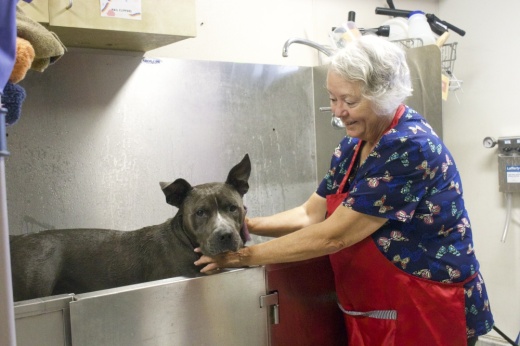The city’s bond is split into five propositions for public safety, mobility, drainage, municipal facilities and a new animal shelter, as the shelter’s cost has grown from $12 million to $20.36 million and was put on hold from the city’s last bond until more funding was secured, officials said.
“One of the options was to build with the money that we have, and basically it gives us what we have now,” Director of Special Projects Jennifer Brown said at the May 10 Animal Advisory Board meeting. “It doesn’t give us any bigger of a facility.”
The bond items were identified as growing needs for Sugar Land by city officials, council members and residents through citizen satisfaction surveys, community meetings and master plans, Deputy City Manager Jennifer May said.
Breaking it down
More than 41% of the 2024 bond focuses on the city’s public safety sector, including new police department headquarters and building Phase 3 of the Public Safety Training Facility.
Although council approved two modular buildings and existing space renovations in June, Police Chief Mark Poland said this only catches the department up on lost space previously used for training and doesn’t account for growth.
“Policing today in 2024 is so dynamic in the challenges that our officers face and the decisions they have to make in split seconds—whether it’s a threat or whether it’s a mental health crisis that they’re responding to,” he said.
The city is proposing $118 million in streets and sidewalk projects, including $59.28 million toward the local match for 11 city projects approved in Fort Bend County’s November 2023 mobility bond.
The projects help advance the city’s Mobility Master Plan adopted in July 2023 with a goal to keep the city safe and connected, Transportation and Mobility Manager Melanie Beaman said.What it means
If approved, the bond package would fund $300 million in capital projects over the next five to seven years with $50 million accounting for inflation, May said. Funding for the bond would result in a potential tax increase of no more than $0.05 per $100 property valuation.
The increase would be phased in over time, likely one cent per fiscal year, with an estimated monthly cost to the average resident of less than $5 per month or about $20 per month by 2030, excluding property revaluation, she said.
“Ultimately, each year, the City Council would have a decision to make on [the increase],” May said. “I think the goal would be to have an even implementation over that timeframe.”Looking back
There are still 13 outstanding projects from the city’s November 2019 bond and one project remaining from the November 2013 bond, according to the city’s website.
Only the Ditch H trail project, which has since been renamed to the Sugar Land Trail Phase 1, remains unfinished from the 2013 bond and is set to start construction soon, May said. Additionally, two projects from the 2019 bond were put on hold until the 2024 bond is decided, she said.
City officials said the status of projects from the 2019 bond are as follows:
- 7 projects completed
- 3 projects in design
- 8 projects under construction
- 2 projects on hold, including the animal shelter and Emergency Operations Center/Public Safety Dispatch building
Ahead of the Nov. 5 election, city officials will continue bond education for the public at various community events, including:
- Homeowner association meetings
- Block parties
- Special events
If approved, bond projects could begin progress as early as fiscal year 2025-26 after necessary budgeting phases are completed, May said.
On the flip side, if a proposition is not approved, the city will not be eligible to issue certificates of obligation for the projects for at least three years, city officials said.
According to the city’s financial management policy statement, Sugar Land residents can expect to see the next bond in approximately five years or when City Council deems it necessary.
“Bond elections provide residents an opportunity to determine which projects, if any, should be funded," May said. "Our goal is to just raise awareness about the bond election, and then residents get to make that decision when they vote.”





